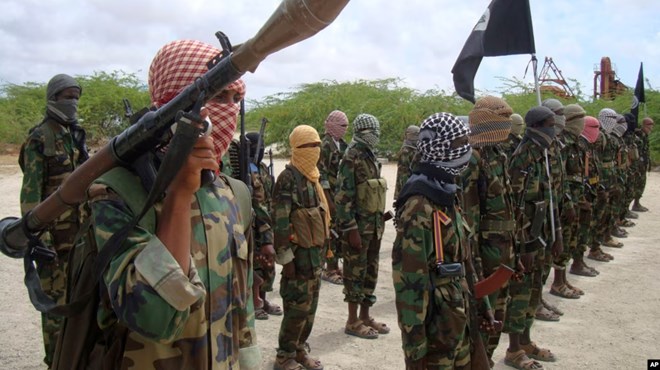
Tuesday March 11, 2025

(FILE) Al-Shabab fighters display weapons as they conduct military exercises in northern Mogadishu, Somalia, on Oct. 21, 2010.
"We encourage dialogue between the Yemen and Al-Shabaab sanctions Panels ... to shed light on and ultimately sever the ties between the Houthis and Al-Shabaab," said Ambassador Kelley.
An international response is needed to address the growing connection between al-Shabaab and the Houthi terrorist group based in Yemen, said Acting U.S. Alternate Representative to the UN, John Kelley:
“The Red Sea smuggling routes connecting Somalia-based terrorist groups to those in Yemen place a premium on international cooperation.”
“We are concerned by growing ties between Al-Shabaab and the Houthis in particular. We encourage dialogue between the Yemen and Al-Shabaab sanctions Panels, and countries in the Horn of Africa and the Arabian Peninsula, to shed light on and ultimately sever the ties between the Houthis and Al-Shabaab.”
The comments came as the United States supported a UN Security Council resolution to renew sanctions on al-Shabaab. The resolution will renew some arms embargos, travel bans, and asset freezes on the terrorist group.
It will also extend the mandate for a Panel of Experts on Somalia to report on al-Shabaab’s finances and activities to the Security Council and the U.N. al-Shabaab sanctions committee.
“[T]he measures in this resolution will curb al-Shabaab’s, and other non-state actors’, access to funds and weapons needed to carry out attacks and address the drivers of conflict in Somalia. They will also ensure Somalia’s security and the police institutions can receive the needed resources to combat terrorism and secure the people of Somalia.”
Ambassador Kelley also called for additional designations against al-Shabaab operatives.
The Somalia-based group was designated by the United States as a Foreign Terrorist Organization and Specially Designated Global Terrorist in 2008.
According to the most recent U.S. Department of State Country Reports on Terrorism, al-Shabaab regularly conducted “IED attacks, suicide bombings, complex attacks, targeted assassinations, ambushes along supply routes, and indirect fire” across Somalia. Civilian deaths related to explosive weaponry dramatically increased from the previous year.
Al-Shabaab uses its influence in Somalia to “extort millions of dollars in revenue from residents and businesses,” according to the State Department Report.
“Regional dialogue is also needed to address piracy, weapons trafficking, and the illicit activities that fuel terrorism,” said Ambassador Kelley.
“These designations demonstrate the international community will promote accountability and end impunity for those who undermine peace and security in Somalia and the region.”
The United States will continue to address all threats posed by Al-Shabaab and other terrorist groups around the world that threaten American interests.